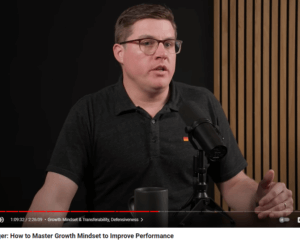
Dr. Robert Lustig: How Sugar & Processed Foods Impact Your Health
The discussion between Dr. Andrew Huberman and Dr. Robert Lustig on the Huberman Lab Podcast provides profound insights into the detrimental effects of sugar and processed foods on our health. The conversation sheds light on how different foods, particularly sugars, affect our bodies and contribute to various health issues. Here’s an analysis of key points from their discussion.
The Misconception of Calories
Dr. Lustig challenges the traditional view that “a calorie is just a calorie” by explaining how different calories, particularly those from sugars, are metabolized by the body in harmful ways. He emphasizes that not all calories are equal because the body processes them differently based on their source.
“Everyone thinks that obesity is about energy balance… but that doesn’t mean a calorie eaten is a calorie eaten.”
This statement highlights the flawed calorie-counting model where all calories are considered equivalent. Dr. Lustig’s research suggests that the source of calories—whether they come from proteins, fats, or carbohydrates—significantly affects how they are metabolized and their impact on our body.
The Unique Dangers of Fructose
A significant part of the podcast was dedicated to discussing the dangers of fructose, a type of sugar found in many processed foods and sweetened beverages. Unlike glucose, which is used by every cell in the body, fructose is processed almost exclusively in the liver where it’s converted into fat.
“Fructose… is completely vestigial to all vertebrate life. There is no biochemical reaction in any vertebrate that requires dietary fructose.”
Dr. Lustig explains that fructose consumption is linked to increased fat production in the liver, leading to insulin resistance, obesity, and diabetes. It also triggers addiction-like responses in the brain, which makes quitting sugar particularly challenging.
The Role of Fiber and the Gut Microbiome
The discussion also covered the importance of dietary fiber and its role in mitigating the harmful effects of sugar. Fiber helps slow the absorption of sugar, reduces appetite, and supports the health of the gut microbiome.
“The fiber forms a gel on the inside of your intestine… this prevents absorption of those [sugar] calories… feeding your microbiome instead.”
This insight underscores the importance of consuming fiber-rich foods, which not only prevent sugar spikes but also nourish the gut bacteria, playing a crucial role in overall health.
Implications for Dietary Choices
Dr. Lustig’s research advocates for a dramatic reduction in sugar consumption, particularly fructose, and an increase in fiber-rich foods. By understanding the specific impacts of different types of food on our metabolism, individuals can make informed dietary choices that support long-term health and well-being.
Conclusion
The conversation between Dr. Huberman and Dr. Lustig provides a compelling argument against the consumption of high-sugar, low-fiber diets. It is clear that the type of calories we consume has a profound impact on our health, far beyond the simple measure of caloric content.
This analysis reveals the importance of questioning conventional dietary advice and underscores the need for a paradigm shift towards food quality over calorie quantity.





